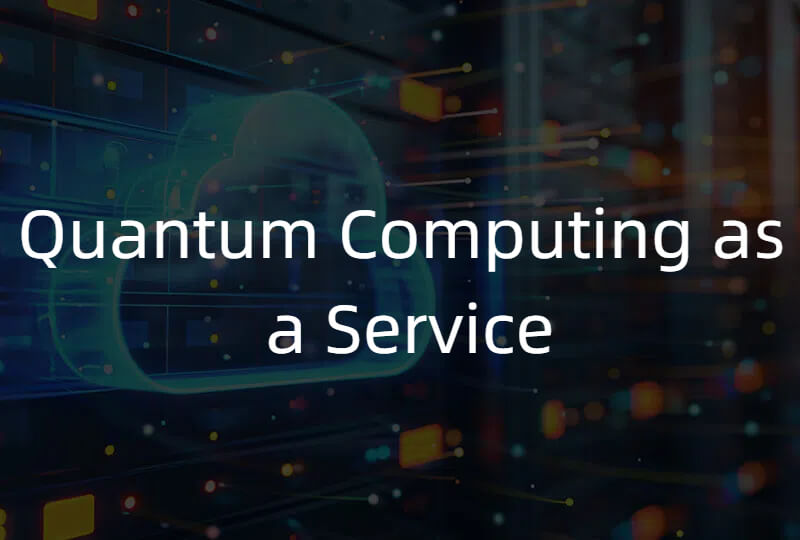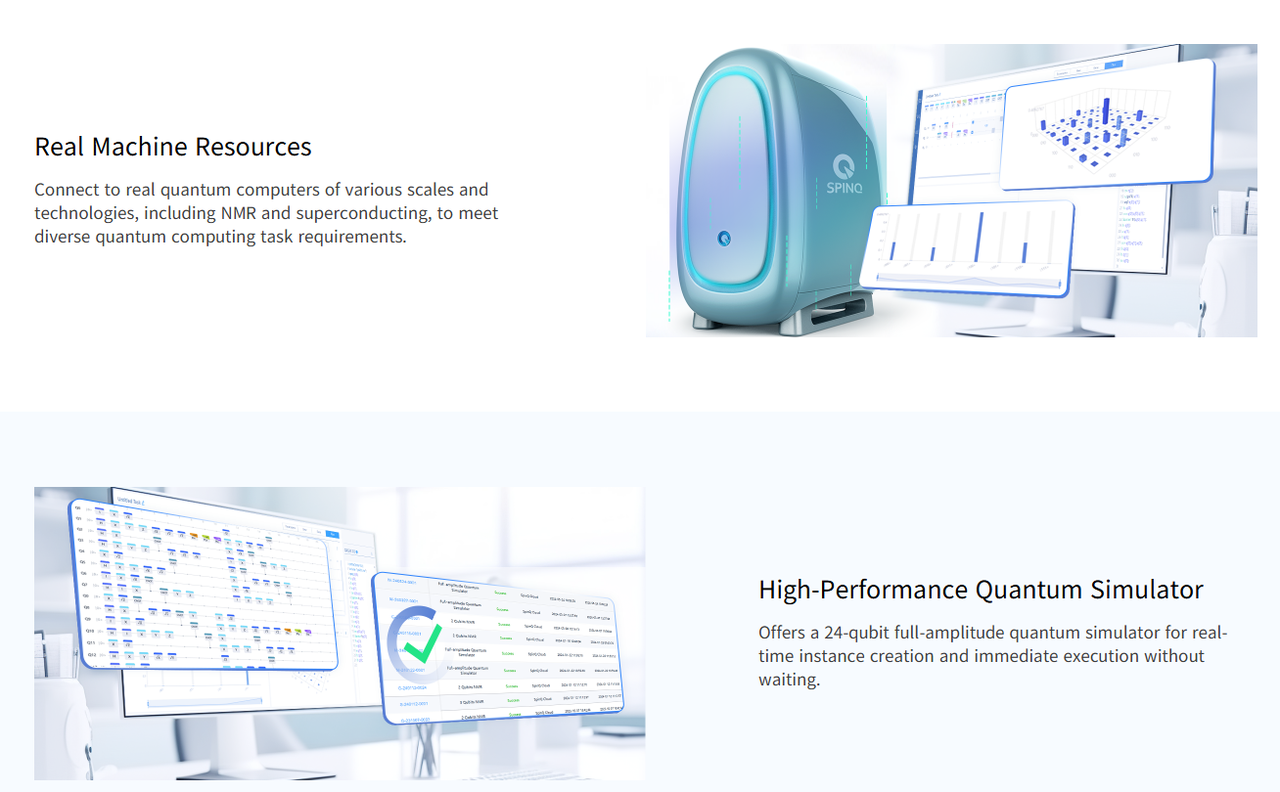Quantum Computing as a Service: Use Cases and Benefits
2025.05.12 · Blog quantum computing as a service
What Is Quantum Computing as a Service (QCaaS)?
Quantum Computing as a Service (QCaaS) refers to the cloud-based delivery of quantum computing resources, allowing users to access quantum processors, simulators, and software development environments remotely—without owning quantum hardware.
Just like traditional cloud computing democratized access to powerful servers, QCaaS brings the capabilities of quantum machines to researchers, developers, and enterprises through on-demand, pay-as-you-go platforms.

Why Quantum Computing as a Service (QCaaS) Matters in 2025
Owning and operating a quantum computer is extremely costly and complex, requiring cryogenic systems, quantum control electronics, and quantum hardware engineers. QCaaS eliminates these barriers by:
-
Enabling global access to quantum processors
-
Accelerating quantum research and innovation
-
Providing scalable development environments
-
Reducing the total cost of ownership
With QCaaS, users can run real quantum algorithms, test hybrid quantum-classical workflows, and build quantum applications without specialized infrastructure.
Key Components of Quantum Computing as a Service
1. Quantum Hardware Backends
QCaaS providers connect users to various quantum processing units (QPUs), including:
-
Superconducting Qubits (e.g., IBM, Google, SpinQ)
-
Trapped Ion Qubits (e.g., IonQ, Quantinuum)
-
Photonic Qubits (e.g., Xanadu, PsiQuantum)
-
Neutral Atom Arrays (e.g., QuEra, Pasqal)
Users can select hardware platforms based on application needs—such as coherence, gate fidelity, and qubit count.
Also Read: 9 Types of Qubits Driving Quantum Computing Forward [2025]
2. Quantum Simulators
Since today’s hardware is still noisy and limited in scale, QCaaS platforms offer high-fidelity quantum simulators that mimic quantum behavior on classical systems—ideal for algorithm testing, debugging, and early-stage prototyping.
3. Software Development Kits (SDKs) and APIs
Most QCaaS providers offer SDKs, compilers, and APIs for programming in Python or QASM. Popular frameworks include:
-
Qiskit (IBM)
-
Cirq (Google)
-
SpinQit (SpinQ)
-
PennyLane (Xanadu)
-
Ocean SDK (D-Wave)
-
Braket SDK (Amazon)
These tools allow users to write, simulate, and deploy quantum circuits with ease.
4. Hybrid Quantum-Classical Workflows
Quantum computers are often integrated with classical resources (CPUs, GPUs) for tasks like:
-
Data pre-processing
-
Parameter optimization
-
Post-processing measurement results
QCaaS supports hybrid architectures, often through Jupyter-based notebooks or managed container environments.
5. Resource Management and Billing
QCaaS platforms track user activity and charge based on:
-
Execution time
-
Qubit usage
-
Job priority (standard vs. premium)
Enterprise users may receive reserved access, SLAs, and dedicated support.
Leading Providers of Quantum Computing as a Service (QCaaS) in 2025
Several top quantum computing companies and emerging quantum startups are now offering cloud-based quantum computing services. Below is an overview of the most prominent QCaaS providers:
#1 IBM Quantum
IBM Quantum offers one of the largest and most mature public quantum computing fleets, built on superconducting qubit technology. Through its Qiskit SDK and IBM Quantum Platform, developers and researchers can access real quantum processors and simulators with a rich ecosystem of tools and documentation.
#2 Amazon Braket
Amazon Braket provides a versatile quantum computing service that aggregates access to multiple hardware backends, including systems from IonQ, Rigetti, Oxford Quantum Circuits (OQC), and Xanadu. This multi-vendor architecture gives users flexibility to test and deploy algorithms across diverse quantum technologies within a unified AWS environment.
#3 SpinQ Cloud
SpinQ Cloud links various real quantum computing systems, featuring quantum computers with 2, 3, 5, and 8 qubits, and a high-performance simulation platform with up to 24 qubits. SPINQ Cloud not only meets the research needs of scientific researchers but also provides sufficient machine time for enthusiasts in the field of quantum computing.

#4 Microsoft Azure Quantum
Microsoft Azure Quantum focuses on hybrid cloud-native quantum workflows, integrating quantum hardware partners such as IonQ and Quantinuum. The platform also supports classical-quantum interoperability and optimization solvers, making it ideal for enterprise-grade quantum research and development.
#5 Google Quantum AI
Google Quantum AI delivers access to high-performance superconducting quantum processors, known for their advanced fidelity and speed. Its Cirq framework is widely used for algorithm development, and Google continues to push the frontier of quantum error correction research with its latest Willow chip and through its cloud-accessible infrastructure.
#6 Xanadu Cloud
Xanadu Cloud is built on photonic quantum computing, enabling ultra-fast sampling and continuous-variable quantum processing. The platform is tightly integrated with PennyLane, an open-source library for quantum machine learning and hybrid quantum-classical models, making it especially popular in the AI research community.
#7 D-Wave Leap
D-Wave Leap offers quantum annealing-based computing optimized for combinatorial optimization problems. As one of the earliest commercial quantum cloud platforms, D-Wave provides real-world solutions for logistics, scheduling, and financial modeling with thousands of qubits accessible on demand.
Real-World Applications of Quantum Computing as a Service
Quantum Computing as a Service (QCaaS) is no longer a theoretical concept; it is already being applied across multiple industries to tackle complex problems previously unsolvable by classical computers.
Below are several key sectors where QCaaS is making a measurable impact:
#1 Pharmaceutical Industry
In the pharmaceutical industry, quantum computing is being used to simulate molecular energy states with high accuracy, accelerating the drug discovery process. By modeling quantum interactions at the atomic level, researchers can identify potential drug candidates faster and more efficiently than through traditional simulation methods.
#2 Finance Field
The financial sector leverages quantum computing for portfolio optimization and advanced risk modeling. Quantum algorithms can evaluate large datasets and market variables to find optimal asset allocations and assess systemic risk in ways that surpass conventional computational approaches.
Also Read: How Quantum Computing Benefits Financial Services [2025]
#3 Supply Chain and Logistics
In supply chain and logistics, quantum annealing and hybrid algorithms help solve complex scheduling and routing problems. This results in more efficient transportation networks, reduced operational costs, and improved supply chain resilience—especially valuable in global distribution systems.
#4 Artificial Intelligence and Machine Learning
The field of artificial intelligence and machine learning (AI/ML) benefits from quantum-enhanced models that process data in new ways. Quantum machine learning algorithms can offer advantages in pattern recognition, optimization, and dimensionality reduction, especially when integrated with classical frameworks.
Also Read: How Quantum Computers Will Revolutionize AI Development
#5 Cybersecurity
Cybersecurity is another critical area where quantum computing plays a transformative role. QCaaS platforms are used to test quantum-safe cryptographic algorithms, helping organizations prepare for the post-quantum era and safeguard sensitive data against future quantum attacks.
#6 Quantum Education and Quantum Research
Quantum education and research are being revolutionized by cloud-based access to quantum hardware. QCaaS providers now offer hands-on lab environments for students, educators, and academic institutions, democratizing access to real quantum systems and accelerating skill development in the next generation of scientists and engineers.
Challenges in Quantum Computing as a Service (QCaaS) Adoption
While promising, QCaaS still faces hurdles:
-
Noise and decoherence on current quantum hardware
-
Steep learning curve in quantum programming
-
Limited qubit counts for complex applications
-
Security and data privacy concerns in cloud environments
However, these limitations are shrinking as hardware matures and platforms improve their usability and abstraction layers.
Future of Quantum Cloud Computing in 2025 and Beyond
Key trends include:
-
Error-corrected logical qubits accessible via cloud
-
Full-stack integration with AI, HPC, and edge devices
-
Region-specific quantum cloud for data sovereignty
-
Industry-specific quantum apps delivered as managed services
Final Thoughts
Quantum Computing as a Service (QCaaS) is transforming how developers, scientists, and businesses experiment with and leverage quantum computing. As cloud access improves and quantum hardware advances, QCaaS will become the bridge that connects the real world to quantum-powered solutions. Whether you're a startup, enterprise, or academic, quantum cloud is the easiest way to get started.
Featured Content






